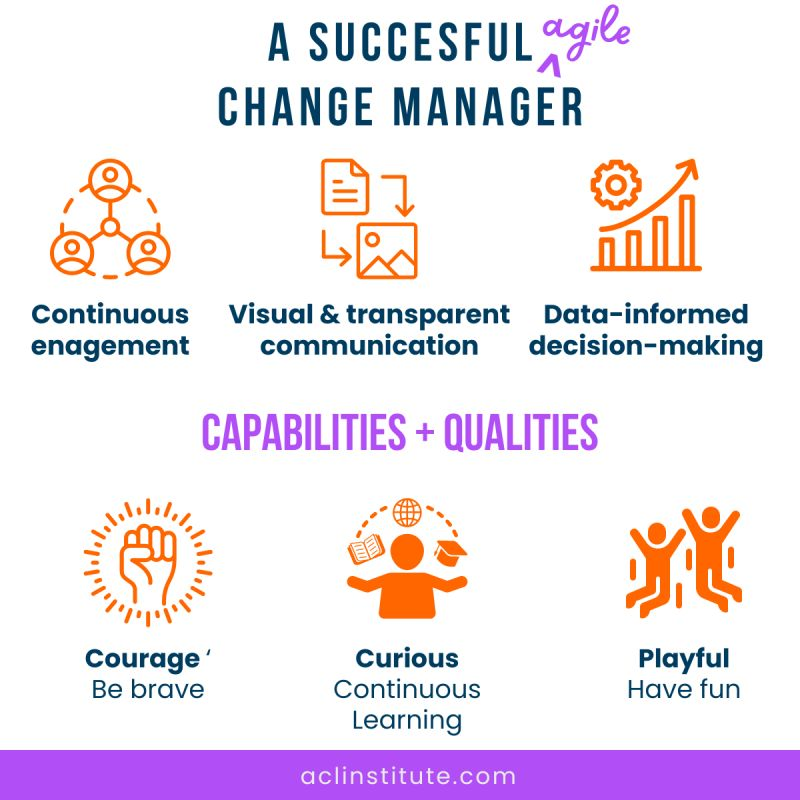Change is no longer a buzzword—it’s the backbone of any organisation that wants to thrive in 2025.
Companies are evolving faster than ever, and they need skilled change managers to guide them through the complex landscape of transformation.
So, what does it take to deliver successful change initiatives?
Whether you’re an aspiring professional or looking to refine your skills, becoming a change manager requires more than just understanding theory.
It’s about mastering agility, leadership, and emotional intelligence to influence and empower teams in the face of uncertainty.
Sometimes change managers tell us they would never get to work in an agile way. And that’s a good point, some organisations do not need to be more agile.
There are also some organisations that culturally would never cope.
But does that mean a change manager shouldn’t adopt adaptive ways of working?
No!
When it comes down to it, an effective change manager, whether in an Agile project environment or not, embodies three core qualities: bravery, curiosity, and playfulness.
Importantly, they also possess three core capabilities: visual and transparent communication, continuous engagement, and data-informed decision-making.
Imagine being the person who can turn disruption into opportunity, driving organisational success by managing change effectively.
With the right capabilities, qualities, skills and education, you can become a pivotal figure in any company, leading impactful transformations that benefit both employees and the bottom line.
Ready to take the next step?
Here’s your guide to becoming a successful change manager in 2025, outlining the capabilities qualities, skills, qualifications, and trends you need to know.

Why is Change Management Important in 2025?
Multiple sources are telling us that the pace of change has increased exponentially.
The NeuroLeadership Institute tells us it’s an increase of 183% over the last five years.
Gartner tells us that in 2016, the average business faced two planned enterprise-wide transformations each year.
In 2023, that rose to 11 per year.
PWC shares that over 60% of their people experienced more change at work in the last year than the 12 months prior.
The impact of ‘stacked and continuous change’ can be significant and result in high costs financially, employee well-being, and at the customer level if not managed well.
It means that the role of the change manager remains in demand and critical to business success.
When you break down what is required to be a successful change manager there are 4 elements
- 1.Capabilities
- 2.Qualities
- 3.Technical Skills
- 4.Education and Knowledge
Capabilities Required to Become a Change Manager
Visual and transparent communication is a core capability in agile change management.
It focuses on presenting complex information in a brain-friendly way, using tools like infographics, icons, and micro-videos.
This type of communication is essential to engage teams and build trust by making progress and data visible to everyone.
Leaders who share authentic stories and progress openly create a sense of relatability, enhancing the success of change initiatives.
This approach fosters collaboration and drives successful outcomes by ensuring clarity and openness.
Learn more about this topic in our article about Visual and Transparent Communication.
Continuous engagement in agile change management focuses on co-creating and collaborating with stakeholders throughout the change process.
Rather than simply seeking approval, this approach ensures that all voices are included, promoting deeper involvement and commitment.
By identifying key influencers within both formal and informal networks, continuous engagement builds trust and encourages active participation.
This method enhances the sustainability and effectiveness of change initiatives, ensuring that solutions are collaboratively developed and supported across the organisation.
Learn more about this topic in our article about Continuous Engagement.
Data-informed decision-making in agile change management relies on a structured approach to gathering and analysing relevant data.
It involves leveraging organisational tools, running experiments, and using a combination of empirical research, stakeholder sentiment, and practitioner experience to guide decisions.
This approach helps ensure that changes are based on evidence rather than intuition alone, enhancing the likelihood of success.
Digital platforms like Workday, Yammer, and Culture Amp offer useful data, and the ability to adapt based on insights gathered through beta testing is crucial.
Learn more about this topic in our article about Data-Informed Decision-Making.
Qualities Required to Become a Change Manager
From our experience, the most successful change managers possess a distinct set of qualities that enable them to navigate complex transformations.
These traits, developed through hands-on experience, allow change leaders to inspire others and foster a culture of adaptability and progress:
- Courage: Successful change managers are brave. They are the ‘voice for the voiceless’ and speak up in front of leaders who don’t always want to hear what has to be said.
- Curiosity: Successful change managers employ a beginner’s mindset and are endlessly curious, taking nothing for granted. They uncover organisational truths that act as barriers to successful change.
- Playfulness: A successful change manager has fun with their work. They test and learn in a spirit of play. This playfulness is contagious and encourages other to try new things.
We’ve seen firsthand how these qualities—courage, curiosity, playfulness—enable change managers to overcome obstacles and drive lasting results.
By embracing and honing these characteristics, change managers are equipped to lead organisations through any challenge.
What is agile change management?
Agile change management is a relatively new practice that is fast taking over the business world.
Agile change management is a body of work that seeks to support people through the delivery of change at speed with lean resourcing.
It applies to both business agility transformations and the context of agile delivery of technology and product releases or projects.
The foundations of the agile change management body of work are an agile mindset, agile change practices and tools, and agile change ways of working.
It encourages an adaptive approach to how we support people through change and lets go of heavy tools, processes and restrictive controls.
Technical Skills Required to Become a Change Manager
While the demands of change management evolve with time, the most successful change managers consistently demonstrate a core set of technical skills that set them apart. These skills include:
Leadership and Communication
Effective change managers must be skilled leaders, capable of influencing and motivating teams.
They communicate clearly and transparently, ensuring all stakeholders are aligned and informed throughout the process.
Leadership involves setting a clear vision, while communication ensures that the vision is understood and embraced by all.
Emotional Intelligence
Understanding and managing emotions—both their own and others—is key for change managers.
Emotional intelligence helps them navigate resistance, build trust, and foster positive relationships within the team, which is crucial for driving successful change.
Project Management
A successful change manager must possess strong project management skills to ensure that all elements of a change initiative are planned, executed, and monitored effectively.
This includes managing timelines, resources, and ensuring that key milestones are met without compromising quality or goals.
Problem-Solving & Strategic Thinking
Change managers are often confronted with complex challenges.
The ability to think critically and develop creative solutions is essential.
Strategic thinking allows them to anticipate obstacles and craft plans that align change initiatives with long-term organisational objectives.
Agility and Adaptability
In the ever-changing landscape of organisational transformation, change managers need to be agile and adaptable.
They must be ready to pivot strategies and approaches quickly in response to evolving circumstances, ensuring the change initiative stays on track even when new challenges emerge.
Political Nous
Understanding the internal politics of an organisation is crucial.
A skilled change manager can navigate these dynamics effectively, leveraging key relationships and alliances to drive change.
Political nous helps in identifying influencers and mitigating resistance from stakeholders.
Business Acumen
A strong grasp of business fundamentals is essential for change managers.
They need to understand how different parts of the organisation work together and how changes will impact operations, finances, and the overall business strategy.
This skill allows them to make informed decisions that align change initiatives with organisational goals, ensuring that changes drive measurable value.
Education and Knowledge Required to Become a Change Manager
One of the most common questions asked is “Do I need a degree, diploma or certification to become a successful change manager?”
If you are a talented self-learner then the answer is no.
There is an abundance of books, blogs, and videos out there that share knowledge on the field of change management.
However, most organisations do expect to see some form of formal education in change management.
There are three ways you can acquire formal education in this field and these include:
- Accreditations
- Certifications
- Formal Study
Each of these options has pros and cons however these will differ from person to person.
The right path is unique to you, so we’ve published a detailed guide to help you evaluate the best change management course for your needs.
This article breaks down the 13 key criteria we believe you need to consider when finding the course that best aligns with your objectives and aspirations as a change manager.
Practical Steps to Becoming a Change Manager
Based on how you answered the questions presented in the last topic, you’ll have a clearer understanding of which type of education or training aligns with your needs.
Whether it’s formal study, certification programs, or industry-specific accreditations, the path you choose should suit your learning style, career goals, and the expectations of the organisations you aspire to work with.
This foundation will set the stage for building the critical skills needed to thrive as a change manager.
Seek real-world experience in managing change.
Start by volunteering for internal projects or taking on roles in project management.
Work with mentors to guide you through complex initiatives, and don’t shy away from opportunities where you can lead transformation efforts, no matter how small.
If you don’t have access to these types of opportunities, get in contact with a specialised change management recruiter.
In Australia, Momentum Search & Selection, U & U, White Cloud Recruiting. Have a look at the resources they have available to see how you would fit in their client’s roles.
Each industry presents unique challenges in managing change.
Whether you’re in finance, healthcare, or tech, understanding the regulations, processes, and culture of your industry can be a game-changer.
Attend sector-specific conferences, read relevant case studies, and stay updated on trends that impact your field.
Join professional associations like the Change Management Institute (CMI) or the Association of Change Management Professionals (ACMP).
Attend webinars, workshops, and networking events where you can meet experienced change leaders.
These relationships are invaluable for advice, support, and career advancement.
Change management is constantly evolving, particularly with digital transformation and remote work.
Stay informed through publications, podcasts, and ongoing learning.
Focus on mastering tools like data analytics, AI, and cloud-based platforms, which are becoming essential in executing and measuring change initiatives effectively.
Trends in Change Management for 2025 & Beyond
In her Primer for Change Newbies, co-founder Lena Ross shares resources to help people ease into the profession.
This includes consideration of what are the frontier capabilities. These include:
Design Thinking
In change management, design thinking can be applied to view employees as internal customers, using human-centred design (HCD) to gather insights and empathise with their needs.
By integrating HCD into change plans, you focus on what employees should do, think, and feel during transitions.
This approach encourages meaningful conversations, stakeholder engagement, and the creation of employee journey maps to represent the current and future impacts of change visually.
Design thinking helps build innovative, user-centred solutions that foster smoother adoption of new processes.
Agile Mindset
An agile mindset goes beyond methodology; it’s about adaptability, openness to new ideas, and embracing continuous learning.
Change managers with an agile mindset foster curiosity, ask questions, and approach challenges with a beginner’s mindset—putting aside biases and past experiences.
This mindset encourages resilience, viewing failures as learning opportunities rather than setbacks.
By modelling agility, even in non-agile environments, change managers can drive innovation, adapt to evolving circumstances, and lead their teams more effectively in today’s complex and fast-moving landscape.
Applied Neuroscience
Applied neuroscience in change management leverages brain science to improve how we lead and manage transitions.
Managers can reduce resistance and enhance engagement by understanding how the brain responds to reward, threat, and discomfort during change.
Techniques such as framing change in ways that minimise the brain’s threat response, and recognising cognitive biases, can foster smoother transitions.
Applied neuroscience also highlights that not all human responses to change are negative, encouraging leaders to shift their approach to be more empathetic and brain-friendly for optimal performance during change initiatives.
Digital Literacy
In 2025, digital literacy is essential for change managers, both inside and outside the workplace.
It enables you to leverage social media, AI tools like ChatGPT, and collaboration platforms to build a Personal Learning Network (PLN) and co-create solutions efficiently.
Integrating these tools fosters quicker problem-solving, crowdsourcing, and knowledge sharing.
Leading by example in using these digital platforms to engage, collaborate, and share can drive innovation and break down traditional silos, ensuring teams remain adaptive in a rapidly evolving technological landscape.
Behavioural Science
Behavioural science helps change managers understand human responses to change, including how cognitive biases and primal threat-reward systems influence decision-making.
By applying these insights, change managers can design initiatives that reduce perceived threats and foster engagement.
Neuroimaging advances have uncovered valuable knowledge about how the brain reacts to change, enabling leaders to minimise discomfort and boost performance.
Understanding how employees perceive gain or loss allows for more effective, two-way engagement that promotes autonomy and fairness, ultimately leading to better outcomes during organisational transitions.
Ready to start your journey towards becoming a successful change Manager?
There are many resources available to you to help guide you on your journey if you are new to change management.
Start with the Primer for Change Newbies – it’s free and yet the value is priceless.
If you wish to be able to hit the ground running with tools and templates then you might like our Ultimate Change Manager Starter Pack.
And if you are already a change manager who is looking for what will it take to make you stand out and be successful, well then you might like our Future of Change package where we cover applied neuroscience, agile change and design thinking for change management.



